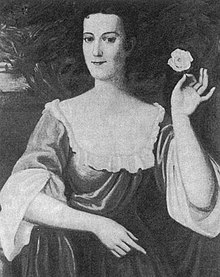Sally Fairfax
Sarah Cary known as "Sally" Fairfax (* around 1730 , † 1811 in Bath ) was George Washington's first love .
Life
Sally Fairfax came from one of the oldest and richest families in Virginia . One of her ancestors was Miles Carey, who came to America from Bristol in the mid-seventeenth century and established himself as a Virginia nobleman. Her father, Colonel Wilson Cary, a member of the House of Burgesses , inherited one of Virginia's greatest fortunes and the Ceelys on the James family estate . Little is known about his wife Sarah, Sally's mother. The eldest of Colonel Cary's four daughters, Sally, was much sought-after and was the grande belle of Virginia society. She had many admirers and eventually George William Fairfax won her favor. According to the reports of Wilson Miles Cary, a writer and family historian, the wedding was announced in the Virginian Gazette in December 1748 . After their marriage, Sally and George William moved to the Belvoir Plantation , which had been built by his father Colonel William Fairfax in the early 1740s.
The Fairfax family, like the Cary family, represented a holdover of European feudalism and English aristocracy. The members of the family held the reins of Virginia's social and political power in their hands.
George Williams' sister Anne Fairfax married Lawrence Washington shortly after her brother got married. Young George Washington, Lawrence's half-brother, began visiting Belvoir regularly . Lawrence wanted to support his brother, so brought George together with George William. A friendship developed between the two men, despite the fact that George William was much older. A relationship also developed between Sally Fairfax and George Washington. Sally had grown into a highly educated young woman under the Colonel's guidance. As a young man with limited education and a low position on the social ladder, Washington was impressed by this intelligent, well-known, and attractive woman - he believed her to be a model of a woman. She was the key to inspiring the future President of the United States to ascend the social, cultural, and intellectual ladder himself, as reflected in the increasing sophistication of his letters to her.
Washington wrote some well-known letters to Sally, for example in 1758:
“Tis true, I profess myself a Votary to Love […] I feel the force of her amiable beauties in the recollection of a thousand tender passages that I wish to obliterate, till I am bid to revive them - but experience alas! Sadly reminds me how Impossible this is. "
In another letter he made an allusion to the literary figure Juba, the prince of Numidia, who loves Cato's daughter Marcia, from the play Cato the Younger by Joseph Addison . These ambiguities make it difficult for historians today to interpret the true nature of the relationship between the two, and it remains unknown to this day.
Despite the enthusiasm that Sally and young Washington shared, Sally's forbidden temptation was inconsistent with the lofty principles Washington had imposed on itself. Washington married the wealthy widow Martha Dandridge Custis . At first, probably with the intention of increasing his social status, but the connection still seems to have gone well. Sally and George William made frequent visits to Washington's Mount Vernon mansion , which arguably included a tacit consent from their spouses to politely ignore various indiscretions.
The fortunate foursome ended in 1773 when the unrest began before the War of Independence . A loyalist to the British Crown, George William had intended to return to America after the revolt was over, but the success of the Revolution prevented George William and Sally from returning. He died in 1787 and Sally lived alone until her death in 1811.
In the end there were signs of regret on Sally's part. She wrote to her sister-in-law in 1788:
"I know now that the worthy man is to be preferred to the high-born who has not merit to recommend him [...] when we inquire into the family of these mighty men we find them the very lowest of people."
Washington also admitted in a letter to Sally that she was the passion of his youth and informed her:
"Never been able to eradicate from my mind those happy moments, the happiest in my life, which I have enjoyed in your company."
Based on the current analysis of the existing documents, the evidence for an affair between Sally Fairfax and George Washington is very thin, there are doubts as to what the truth, with all the gossip stories, actually looked like. Yet the letters point to a deep relationship between the two that certainly existed.
literature
- Wilson Miles Cary: Sally Cary: A Long Hidden Romance of Washington's Life . The DeVine Press, New York 1916.
- Joseph J. Ellis: His Excellency George Washington . Alfred A. Knopf, New York 2004.
- Nathaniel Wright Stevenson: The Romantics and George Washington . In: The American Historical Review , Vol. 39, No. 2 (January 1934), pp. 274-283.
- Paul van Dyke: Washington . In: Proceedings of the American Philosophical Society , Vol. 71, No. 4 (April 1932), pp. 191-205.
Web links
- Information on Sally Fairfax is available from the Center for History and New Media at George Mason University, Fairfax, Virginia, USA (accessed June 15, 2010).
Remarks
- ↑ a b c All letters quoted from: Wilson Miles Cary: Sally Cary: A Long Hidden Romance of Washington's Life. New York 1916.
| personal data | |
|---|---|
| SURNAME | Fairfax, Sally |
| ALTERNATIVE NAMES | Fairfax, Sarah Cary |
| BRIEF DESCRIPTION | first love from George Washington |
| DATE OF BIRTH | around 1730 |
| DATE OF DEATH | 1811 |
| Place of death | Bath |
